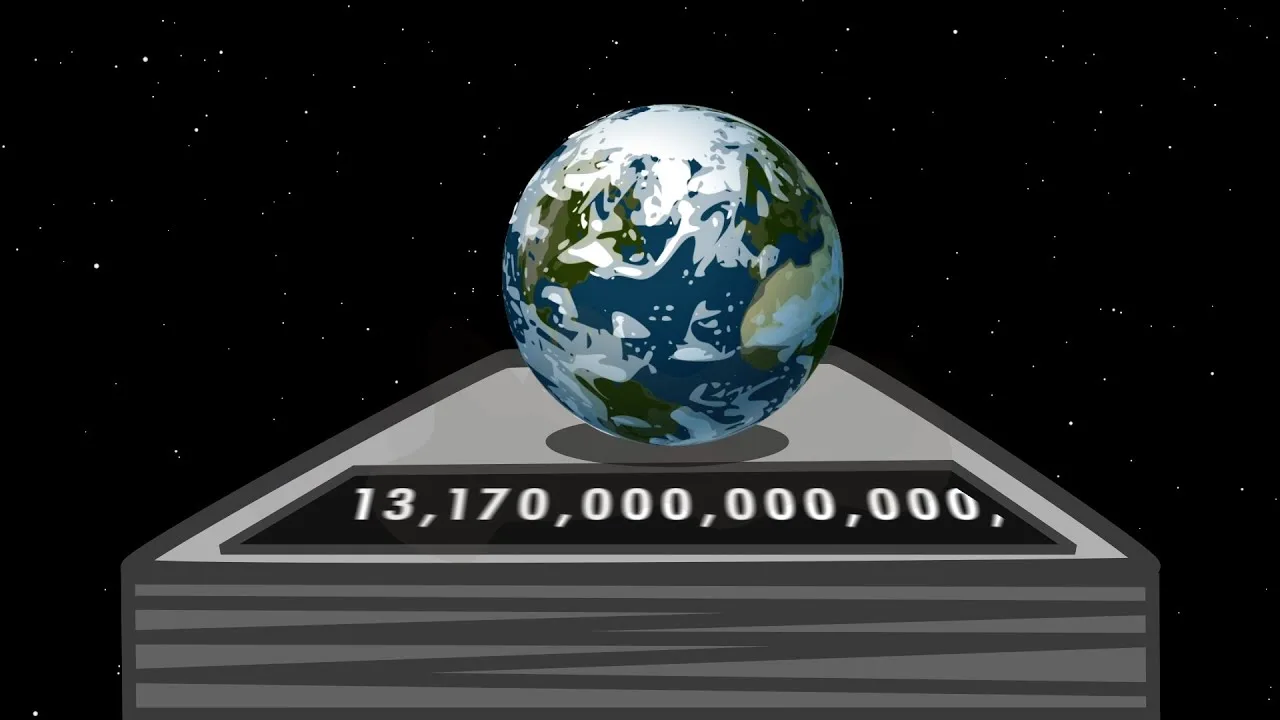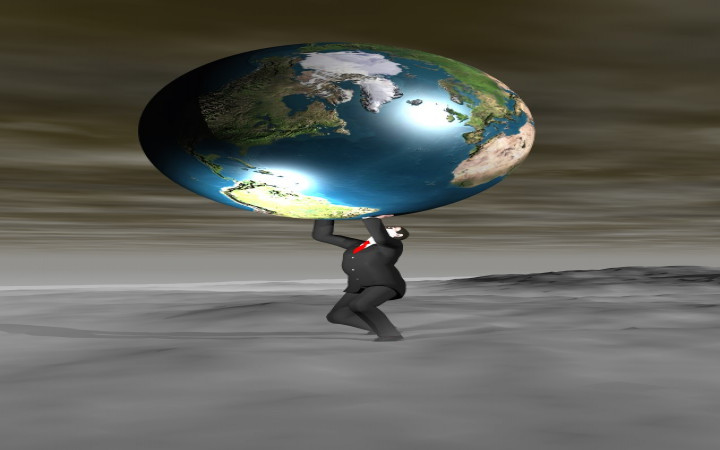How Heavy is the Earth in Pounds

The Earth’s mass is approximately 5.972 x 10^24 kg, which converts to about 13,170,000,000,000,000,000 pounds or 6.585 x 10^23 kg.
Alexa, How heavy is the Earth… in Pounds?
If you were to ask someone how much they weigh, they might give you an answer in pounds. But how much does the Earth weigh? The short answer is that it weighs about 6 sextillion, 588 quintillion metric tons, or 5.974 x 10^24 kg.
But what does that actually mean? Let’s break it down.
A sextillion is a one followed by 21 zeroes, while a quintillion is a one followed by 18 zeroes.
So the Earth weighs about 6,000,000,000,000,000,000 metric tons. That’s a lot of zeroes!
To put this into perspective, if you took all of the humans on Earth and stacked them on top of each other, they would only weigh about 317 million metric tons.
That’s less than 0.000001% of the Earth’s weight!
The Earth is made up of many different things including water, air, rocks, and dirt. The majority of the Earth’s mass comes from its iron core which makes up about 35%.
The rest of the mass comes from the mantle and crust which are made mostly of silicate rocks like granite.
So how did scientists figure out how much the Earth weighs? They use something called gravity measurements.
By looking at how objects interact with each other using gravity, they can calculate the mass of those objects. This has been used to determine not only the weight of planets but also stars and galaxies!
What is the Weight of Earth in Kg
The weight of Earth in kilograms is 5.97 x 1024 kg. This number comes from the mass of Earth, which is 5.97 x 10^24 kg. The mass of Earth is the sum of the masses of all its parts, including the atmosphere, oceans, landmass, and core.
How Much Does the Earth Weigh in Words
The answer to this question may seem like a simple one, but it’s actually quite complicated. To determine the weight of the Earth in words, we need to first understand what a word is. A word is a unit of measurement that refers to the number of letters in a written or spoken language.
In the English language, there are approximately 200,000 words. So, using this definition, we can estimate that the Earth weighs somewhere around 200,000 words.
Of course, this is just an estimate and there are many factors that could affect the final number.
For example, what if we include foreign languages? There are estimated to be over 6,500 languages spoken around the world today. If we include all of these languages, the Earth would weigh significantly more than 200,000 words.
And what about dialects and slang? English has dozens of different dialects and each one has its own unique set of words and phrases. Slang also adds another layer of complexity as it is constantly evolving.
It’s estimated that there are now over 1 million slang terms in use globally. So if we take all of these factors into account, it’s safe to say that the weight of the Earth in words is far greater than our initial estimate.
5.972 × 10^24 Kg
The Sun is the star at the center of the Solar System. It is almost perfectly spherical and consists of hot plasma interwoven with magnetic fields. It has a diameter of about 1.392 million kilometers, about 109 times that of Earth, and its mass (about 2×10^30 kilograms) is about 330,000 times that of Earth.
How Much Does the Moon Weigh in Tons
The moon is said to weigh about 1/81 of the Earth. This would make it’s weight about 81 trillion tons. However, the moon doesn’t have an exact weight because it is constantly changing.
The Moon has a gravitational pull on the Earth which makes the oceans bulge outwards. This causes a high tide on Earth. The Moon’s gravitational force also affects the way that our planet spins.
If the Moon were not there, then days would be shorter and the Earth’s rotation would be faster.
How Much Weight Can the Earth Hold
The amount of weight the Earth can hold is practically infinite. The only limit to how much weight the Earth can hold is the amount of matter that exists in the universe. Even then, it is estimated that the amount of matter in the universe is enough to cause the gravitational collapse of the entire universe into a black hole.
So, if we assume that there is a limited amount of matter in the universe, then the Earth can hold as much weight as there is matter in the universe.
5.972 × 10^21 T
When it comes to magnetic fields, the stronger the better – and that’s exactly what you’ll get with a 5.972 × 10^21 T field. This incredibly strong field is produced by a neodymium magnet, which is made from an alloy of neodymium, iron and boron.
This powerful magnet can be used for a variety of applications, including generating electricity, levitating trains and even creating artificial gravity.
If you’re looking for a way to harness the power of magnets, a 5.972 × 10^21 T field is definitely worth considering!
How Much Does the Earth Cost
It’s no secret that the Earth is a pretty pricey place. After all, it’s the only planet we’ve got! But just how much would it cost to buy the Earth outright?
Well, according to a 2013 study by two British scientists, the value of all the materials on and in our planet amounts to about $5 quadrillion. That’s a mind-boggling sum, to be sure – but it’s still just an estimate. And it doesn’t even take into account things like the oceans or atmosphere.
If we wanted to purchase the Earth from aliens, then we’d have to fork over even more cash. The same study estimates that if we were buying it from an advanced civilization, they would charge us $60 quintillion for everything – that’s 10 times more than all the money in existence!
Of course, these are just ballpark figures.
The real cost of the Earth is immeasurable – after all, there’s no price tag you can put on something as unique and irreplaceable as our home planet.
How Thick is the Earth in Miles
The Earth’s diameter is about 8,000 miles. If you were to cut the planet in half, it would be about 4,000 miles thick from the center to the crust. The mantle, which is the layer of rock below the crust, is about 1,800 miles thick.
The core, which is made up of iron and nickel, is about 1,400 miles thick.

Credit: www.wonderopolis.org
How Many Pounds is the Earth?
There are a lot of misconceptions about the size of the Earth. Many people think that the Earth is much larger than it actually is. In reality, the Earth is only about 4,000 miles in diameter.
That’s just a little over 8 times the diameter of the moon! So how much does all this mass weigh? The answer might surprise you: The Earth weighs only about 6 sextillion tons, or 6 with 21 zeros after it!
To put that into perspective, an elephant weighs around 200 millionth of a trillionth of the Earth’s mass.
Is the Earth Getting Heavy?
No, the Earth is not getting heavy. In fact, it’s actually losing mass every day. The loss of mass comes from the bombardment of high-energy particles from the Sun, which “sandblasts” away about 100 tons of material from the Earth every day.
This erosion has been going on for billions of years and is slowly but steadily whittling away at our planet. So if anything, the Earth is getting lighter!
How Much is Earth Worth?
It’s difficult to assign a monetary value to Earth because it’s not something that can be bought or sold. However, if we looked at the cost of all the natural resources on and within our planet, as well as the cost of maintaining life here, we could come up with a pretty hefty price tag.
For starters, let’s look at the cost of just the water on Earth.
The United Nations estimates that fresh water makes up only 2.5% of all water on our planet. Of that 2.5%, almost 69% is locked up in glaciers, ice caps, and permanent snow cover. That leaves less than 1% of all freshwater available for human use.
If we were to put a price on all of Earth’s freshwater, it would be worth about $13 trillion. But that’s just the cost of the water itself. When you factor in the costs associated with purifying, distributing, and wastewater treatment, the price tag for water jumps to a staggering $400 trillion!
And that’s just one resource on Earth. When you factor in all of the other natural resources like oil, gas, coal, timber, minerals, etc., as well as the costs associated with maintaining life here (e.g., food production, healthcare), it’s safe to say that Earth is worth trillions upon trillions of dollars.
What Would a 100 Pound Person Weigh on That Planet?
Assuming that the planet has the same gravity as Earth, a 100 pound person would weigh 44.545 kg on that planet.
Conclusion
The Earth is quite heavy, weighing in at around 6 sextillion, 588 quintillion pounds, or about 3.0 x 10^25 kg. But don’t worry, it’s not all resting on your shoulders! The majority of the Earth’s mass is actually contained within its core, with the rest being made up of the mantle and crust.





